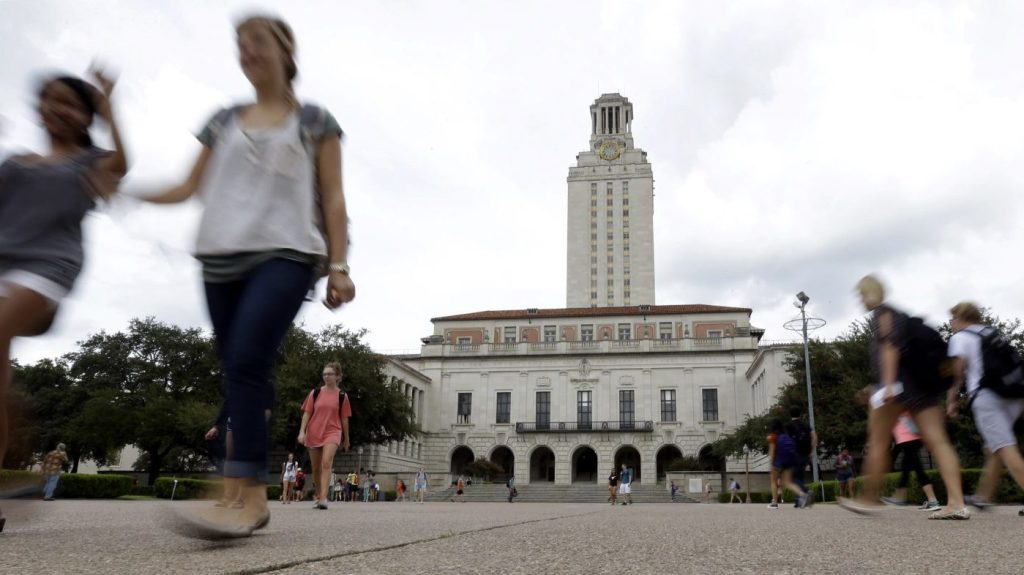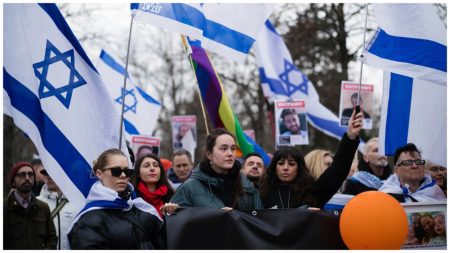AUSTIN — The day after 57 people were arrested during protests on the University of Texas at Austin campus, students are divided over the police crackdown.
On Thursday, similar to the previous day, hundreds gathered for a demonstration aimed at pressuring UT Austin to withdraw support from companies making money from Israel’s conflict in Gaza, and to show opposition to the university’s crackdown on diversity, equity and inclusion (DEI) programs.
Protesters held signs with messages like “Save Gaza,” “Jews for a Free Palestine” and “Jay Hartzell is a Coward,” referring to UT Austin’s president, while the tower that dominates the school’s campus — and the memory of the recent arrests — loomed over them.
Students and faculty supporting Palestine told The Hill that Wednesday’s protests became chaotic because of the police action; students supporting Israel insisted that the police had maintained safety on the campus.
46 out of 57 protesters arrested on Wednesday had their charges dropped by Travis County Attorney Delia Garza, who said all but 13 cases lacked probable cause, according to The Texas Tribune. The Tribune and other local media reported that on Wednesday there “were no signs of violence until authorities armed with batons intervened, handcuffing students and pushing protesters back.”The Texas Tribune reported that on Wednesday “there were no signs of violence until authorities armed with batons intervened, handcuffing students and pushing protesters back.”
Pro-Israel students expressed support for the police response. The arrests on Wednesday “made people realize that they can’t get away with doing whatever they want to do,” Etai, a junior at U.T. Austin, told The Hill.
He said he had seen protesters shoving the police, throwing horse manure, and telling him to “go back to Poland.”
Raneem, a U.T. senior with the school’s Palestine Solidarity Committee, said students had been scared to gather on Thursday “because we didn’t want to be met with the same kind of force. But [today] state troopers and helicopters and mace and whatnot are not being used forcefully on a group of students expressing their First Amendment rights.
Raneem believed Wednesday’s chaos was caused by “instigation by the cops. We were standing and protesting as students. And they would just come in, grab someone and arrest them, and they wouldn’t even be touching the cops or anything.
She mentioned that police arrested a student leader on Wednesday who was trying to disperse participants; that police pepper sprayed into the crowd and “used honestly really, really brutal force” as they pulled them into police cars.
“Many students were throwing up as they were being pulled into cop cars. It’s very unprecedented. No one thought this would be happening.
On Thursday, the Faculty Council, which represents U.T. professors, expressed its “grave alarm” at the arrests on Wednesday. wrote They singled out U.T. president Hartzell’s “decision to invite [Department of Public Safety] officers, armed and in riot gear, onto the Forty Acres to disrupt a non-violent protest.
On Wednesday night, as a backlash to the arrests swelled, Hartzell had written that the University “held firm, enforcing our rules while protecting the
Constitutional right to freedom of expression.” He said that “peaceful demonstrations within our regulations are acceptable. Violating our regulations and disrupting others’ ability to learn are not permitted.”
In statements on Thursday, the university defended the arrests, stating that “roughly half” (47 percent) of the 55 arrestees were not associated with the University of Texas at Austin.
The statement pointed out that “thirteen pro-Palestine freedom of speech gatherings have occurred at the University mostly without incident since October,” but that this protest “expressed intent to disrupt the campus” by occupying the lawn below the administrative building.
The faculty council rejected this response, and a faculty petition
to have a vote of no-confidence against Hartzell is circulating, according to The Texas Tribune. “We don’t believe that President Hartzell’s message to the community Wednesday evening comes close to providing a justification for the University’s conduct,” the Faculty Council wrote on Thursday.
“If we cannot demonstrate how to be accepting of viewpoints with which some (or even many) of us disagree, how can we expect our students or the public at large to do so?”
That’s a statement that professor Kirsten “Kit” Belgum agreed with. A specialist on the rise of German nationalism, she carried a sign that read “Education Requires Freedom of Speech” at Thursday’s demonstration. Belgum told The Hill she had come to the protest because she found the police response on Wednesday “really offensive.”
“I don’t believe in chanting in unison,” she said, as protesters chanted “Free, free Palestine” and “2-4-6-8 Israel is a racist state.”
Even at sport events, Belgum said, such shouts “reminds me too much of Nazi Germany. I don’t do that. But I’m here to challenge the university not to put down a peaceful demonstration with armed military and horses. It seems contradictory to education, and I didn’t see the need for it.”
The police, Belgium said, “potentially escalated [the situation], and that’s what led to today’s protests. And that’s the only reason I’m here. I thought yesterday had a chilling effect on freedom of speech.”
Both pro-Palestine protesters — by far the majority of those gathered on Thursday — and pro-Israel counterprotesters expressed feeling unsafe on campus.
Pro-Palestine protesters with the Palestine Solidarity Committee said that the police on Wednesday had moved in as they tried to obey orders to disperse.
The tense but peaceful protests on Thursday “were more violent than [Wednesday] would have been” if the police hadn’t been involved, said Hadi, a U.T. student who declined to give his last name.
“They gave the university a bad reputation,” Hadi said. “Yesterday would have been more utopic — people sitting on the lawn to read and have study breaks. And the police decided to escalate and bring riot police and batons.”
Raneem, the pro-Palestine senior, argued that the use of police on Wednesday means “everyone should be afraid. Not only Texan residents, not only UT students, but this entire country should be afraid for their democracy because our rights are being infringed upon.”
Pro-Israel counterprotesters told The Hill that they are also concerned that their freedom of speech is being restricted.
One senior with a pro-Israel organization, Gil, told The Hill that he believes his Middle Eastern studies classes are biased against Israel. He mentioned that his Israeli history course, taught by a professor who is a Palestinian citizen of Israel, had a clear anti-Israel perspective.
“I believe it’s not right for a Palestinian to teach Israeli history. Israeli history includes Arab history, but it is a Jewish country. So if you have someone who identifies as Palestinian first, teaching the history of Israel — how can they be fair enough to be impartial?”
During that class last year, Gil said “I would raise my hand every five minutes, raise my hand to correct him because he would either say something that was a bit wrong or forget to mention something that’s very critical to the story.”
He no longer feels comfortable doing this. “Now I don’t because I know that people in classes started shouting at me, calling me a Zionist,” he said.
Jewish opinion at the protests was divided. Jewish Voices for Peace, an anti-occupation group, was at both days of protest in support of the Palestine Solidarity Committee, and many people in the crowd wore kippot or necklaces with the Hebrew word “chai,” meaning life.
But as with much of the alleged anti-Semitism currently being debated on campuses around the country, what made Etai and Gil feel unsafe seemed to largely be the speech of other students — statements in favor of “intifada,” or the Palestinian idea of “uprising” or “shaking off, or other students calling Hamas “a resistance movement.”
AUSTIN — The day after 57 people were arrested during protests on the University of Texas at Austin campus, students are divided over the police crackdown. On Thursday, like the previous day, hundreds gathered for a demonstration intended to pressure UT Austin to divest from weapons manufacturers profiting from Israel’s war in Gaza — as…









